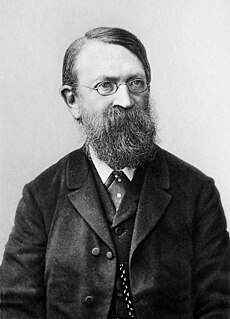Empirio-criticism
Ernst Waldfried Josef Wenzel Mach (/ˈmɑːx/; German: [ˈɛɐ̯nst maχ]; 18 February 1838 – 19 February 1916) was an Austrianphysicist and philosopher, noted for his contributions to physics such as study of shock waves. The ratio of one's speed to that of sound is named the Mach number in his honor. As a philosopher of science, he was a major influence on logical positivism and American pragmatism. Through his criticism of Newton's theories of space and time, he foreshadowed Einstein's theory of relativity.
Ernst Waldfried Josef Wenzel Mach was born in Chrlice (German: Chirlitz), Moravia (then in the Austrian empire, now part of Brno in the Czech Republic). His father, who had graduated from Charles University in Prague, acted as tutor to the noble Brethon family in Zlín, eastern Moravia. His grandfather, Wenzl Lanhaus, an administrator of the Chirlitz estate, was also master builder of the streets there. His activities in that field later influenced the theoretical work of Ernst Mach. Some sources give Mach's birthplace as Tuřany (German: Turas, now also part of Brno), the site of the Chirlitz registry-office. It was there that Ernst Mach was baptized by Peregrin Weiss. Mach later became a socialist and an atheist. His theory and life, though, was sometimes compared with Buddhism, namely by Heinrich Gomperz who adressed Mach as the "Buddha of Science" due to the phenomenalist approach of the "Ego" in his Analysis of Sensations.
...
Wikipedia

